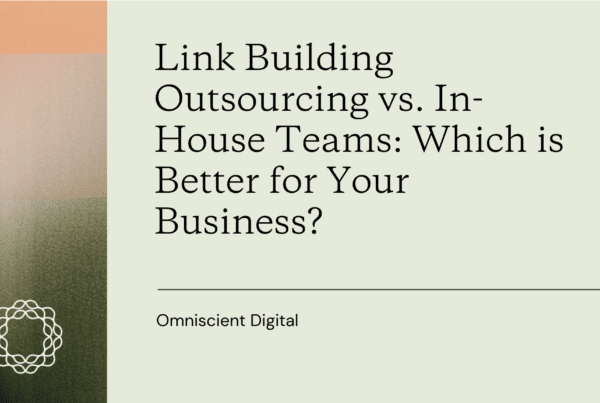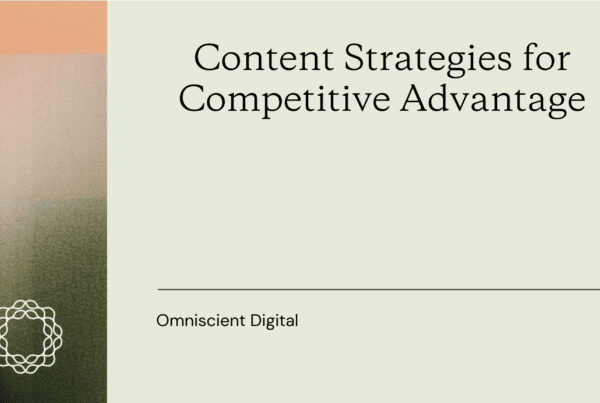At Omniscient Digital, we have strong opinions about what constitutes a valuable contributing member of a team.
In a perfect world, your employee roster consists of dedicated in-house team members committed to bringing your vision seamlessly to life.
But in the real world, you need to constantly juggle what can and should be outsourced—and to who. (Has anyone read Who Not How by Dan Sullivan and Dr. Benjamin Hardy? It’s on our current reading list.)
To make matters more complicated, this can change by the day. On a recent episode of The Long Game, David, Alex, and I put our heads together to talk through what logistics go into the optimum hiring strategy.
Defining freelancer, agency, and in-house employee
For the purposes of this discussion, David, Alex, and I used the following definitions:
- A freelancer is a single person who works outside of your company. They are hired on a contract basis as part of a per-project or retainer relationship. They are taxed as a 1099 independent contractor, versus a W2 employee.
- An agency is a pre-assembled group of people who you hire as a vendor. Typically, there is one point of contact at the agency who is assigned to work with you and coordinates a network of employees and/or freelancers to accomplish the tasks agreed upon.
- An in-house employee is a single person who works directly for your company under a W2 arrangement.
When considering who to hire, there is no one-size-fits-all approach. Let me clarify this from the start—individual company needs vary widely. While some things can never be outsourced efficiently, other things can be farmed out with ease.
Referencing one benefit of hiring an agency, Alex said, “If I don’t have that skill set and I don’t know how to hire for it, I’m either going to have to learn and spend a lot of time with trial and error, or I can bring somebody in or a team of people in and they can get us off the ground, and we can also learn from them.”
Ultimately, you want to select the right person or solution who will help supercharge your content and get the results that you need.
Hiring Freelancers
As a former freelance writer, I know the perspective of an independent contractor firsthand; I’ve been there. Now, as seasoned agency owners and professionals, Alex, David, and I have hired our fair share of freelance contributors.
If you’re considering whether or not to hire freelancers yourself, here are some things we’ve learned.
1. Freelancers thrive on concrete assignments, not strategy.
Most freelancers are typically far removed from an intimate understanding of a company and its products, goals, and target audience. This means they are best suited to projects with clear, finite instructions.
In my opinion, freelance writers are the boots-on-the-ground execution. Sure, there are freelance individuals that will develop strategy in addition to executing that strategy. But my experience has shown me that most freelance writers do their best work with a very detailed brief.
When I was freelance writing, I recall instances when clients would ask me to provide topics or create style guides—with little or no context.
This didn’t serve those organizations well (nor was it a good use of their budget) because I had limited knowledge of their product, the goals of their blogs, and what they wanted readers to do. There are so many fundamental questions to answer before freelance writers can do their best work.
When looking for assistance with high-level strategy, you’re better off seeking out an agency or a freelance professional who is explicitly focused on strategy or the other niche services that you are interested in.
2. Outsource complex and time-consuming tasks.
Alex noted that certain tasks, like link-building or “digital PR,” are well-suited to expert freelancers who are embedded in existing professional networks.
“The stuff you want to outsource is the stuff you can’t do very well. It would take a long time to learn, or it would be expensive to do so, or you don’t want to do,” Alex said.
In the case of link-building, assign the difficult task to a freelance SEO consultant or similar individual who is skilled in that area.
“They’re going to have a lot of the connections. It’s kind of like public relations, right?” Alex said. “You hire a PR firm because they know everybody in media, and they can immediately just go and say, hey New York Times, I’ve got this story, and pitch them that right away. You’re kind of buying the network and the connections. So I would say a function like that I want to outsource almost all the time.”
3. Vet freelancers thoroughly.
Just because a freelancer isn’t an in-house employee doesn’t mean you can’t vet them in a similar fashion.
David shared, “If a company decides to hire a freelancer, they should vet that freelancer the same way they vet an in-house hire. Maybe not like 10 interviews, but have the first call with them, do like a test project, and pay them for it. The key is to see what you’re going to get before you commit to a long-term relationship,” said David.
David recommends getting a true feel for a potential freelancer’s skills and personality before agreeing to a hefty commitment. Yes, you can of course “fire” or discontinue working with a freelancer at any time. But it’s a productive use of both your time and theirs to make an effort upfront.
Even if a freelancer comes recommended or has an impressive portfolio of work, you want to see how they perform for your company in a real-world scenario. This is a good case for conducting a test project.
Next, read our guide to finding, vetting, and onboarding freelancers.
If you skip this step, you have only yourself to blame. “If that’s not something you’re looking for, and you can get a shitty piece of content, it’s kind of on the person hiring to avoid that situation,” David said.
Hiring agencies
Are you ready for an agency?
The answer may be yes—if you have significant funds to spend and have your positioning secured.
1. Dial in your core strategy.
If a company doesn’t have the core, fundamental pieces of strategy in place, they simply aren’t prepared to conduct any sort of professional content work.
“If they’ve raised capital or if they have $2-5 million+ ARR, then they’re in a good situation to at least choose between an agency and an in-house team. If they’re early stage and they don’t have any blog posts written, they haven’t figured out their positioning, they’re constantly changing their value proposition on their homepage—they shouldn’t hire an agency,” said Alex.
When we get prospects like this that slip through our initial lead qualification stage, the team doesn’t pull any punches.
“In the case that we do schedule a call, I almost always tell them, ‘Look, you need to do this. If you want to do content, test the waters on your own. Try some articles, see if you get traction. But you’re not ready for an agency yet,’” Alex said.
2. Find your perfect agency match.
Once you’re ready to commit to an agency, don’t let potential agency partners rush the matchmaking process.
Just like with any relationship, David says you should go into an agency relationship fully informed and on your own terms.
“I think if a company really wants to vet an agency, as much as that agency salesperson wants to move you through the process, they’ll be OK if you slow it down and take it at your own pace,” he said. “Let them know, ‘Hey, we want to make sure you’re the right fit for us, and we’re the right fit for you.’ Don’t follow their sales process. You direct how you want to vet them,” said David.
In other words, feel free to request that the agency contact meet with multiple members of your team, and get them to chat through more than just a blanket promise that everything will be smooth sailing once you sign.
The right agency partner will appreciate your thoroughness as it makes their jobs easier in the long run.
“Don’t just jump into it because the agency promises that they’ll make it smooth and turnkey. I think any agency that sells on simplicity is probably brushing over a lot of the details because I would not tell any client that the work we do together is going to be easy. There’s going to be some bumps in the road, and we’re going to figure it out together,” David said.
That’s why we call them agency partners.
3. Give your agency a decent runway.
While you don’t need to immediately commit years to an agency, we recommend giving an appropriate amount of time for the strategy to take shape and the relationship to blossom.
David shared, “I don’t think anyone wants to sign a year-long commitment to someone that they’ve spoken to a handful of times. But you could do three months to start to better understand how the agency works and how you work together. Then you could decide. Avoid committing to month-to-month; coming from an agency perspective, it doesn’t give us the peace of mind that you’re committed to doing something long term,” David said.
In order to build a truly effective partnership, you need to consider the long game. Content strategy can take months or years to develop, so it follows that you can’t be looking for a silver bullet solution. You have to give your agency team adequate time for discovery and implementation.
“If that expectation is set upfront, you’re doing much more than a month or two months of work. You’re thinking like six months to a year down the line of how this all works together. If both agency and company can get on the same page about how that approach is being taken, it would probably lead to more beneficial relationships,” said David.
Hiring in-house
Finally, it’s time to consider when to bring a bonafide team member on board in the form of a new W2 hire.
At Omniscient, we believe the long game often means using outsourcing options as a stepping stone until you have the time, workload, and resources to justify a new in-house staff member.
If that is the case, leveraging an employee experience app can be an invaluable tool when bringing in-house hires on board since it provides a central place where employees can find HR-related information and resources, which makes things a lot easier for the new employees.
1. Technical products deserve in-house expertise.
The more complex your industry is, the better off you’ll be when it comes to nurturing in-house talent.
In my opinion, the differentiator between in-house and outsourcing comes down to the complexity of the industry and the product. Super technical products deserve a long-term relationship with content strategists.
As a freelancer or agency—I’ve been both—it’s hard to have a short term (like six weeks) window to come in, get to know the product really well, and develop a whole content strategy or team.
If you have a highly technical product or service, you have a few options here:
- Identifying a specialized contractor who you can trust to sink their teeth into the complexities of your company and stick around for a while
- Converting a trusted freelancer to an in-house role over time
- Committing to a long-term (12+ months) agency relationship before you can invest in an in-house hire
- Seeking in-house help from the get-go
Even some of our own clients have transitioned to hiring a full-time role because they think that was the best long-term play. I agree—depending on the complexity of your product, this can be the best use of your budget and energy.
2. Consider moving from agency to freelancer to in-house.
David agreed that sometimes a progression from one type of assistance to another makes the most logical sense. In his mind, a young company can benefit greatly from hiring an agency that can help solidify the strategy, then slowly take the reins over time.
For example, imagine a company is trying to get SEO-optimized content off the ground. They already have a marketing team that’s focused on demand generation, but they don’t have a team focused on creating new, original content.
“It makes sense to hire an agency and hand that off to a team you trust. Then, over time, you can start shifting some of that responsibility in-house, where you might establish some bandwidth with an employee,” David said.
Eventually, an in-house employee might start to own the strategy creation piece, completing it on their own, hiring a couple of freelancers directly, or even bringing on in-house writers to create content under his or her direction—ultimately replacing the more expensive agency relationship.
“This is the best long-term solution and most cost-effective. This happened with one of our clients. In fact, this is probably the best way for us to seamlessly off-board a client—to set them up for long-term success,” said David.
3. In-house is the end goal.
As the above examples and advice allude, thinking about moving work in-house is a valuable end goal in many cases.
A valid question to ask in every hiring scenario therefore becomes: Why can’t we do this in-house?
Depending on the answer, your capabilities, and even the HRIS software you’re using, you can hire accordingly and make a plan of attack for the future.
“Some say they don’t have time to manage the team, or they don’t have the budget to hire someone full-time to write that much content. But, let’s say they had the money—they just don’t have the bandwidth and they don’t have headcount. Then hire an agency,” said David.
Ultimately, if an agency or freelancers can help as stepping stones on the way to success, that’s great. A good agency will understand that businesses evolve, and that a company gaining the ability to hire in-house is a mark of success that should be celebrated.
Investing in the best
Whether you hire remote talent or people from overseas, no matter where you look for talent or what kind it consists of, the best rule of thumb is to properly vet all candidates so that you set up your relationship to thrive.
Hard work is hard to come by
Work ethic isn’t something that only freelancers have or only in-house employees have. There’s no guarantee that any one individual will show up with their A-game each day.
Alex raised the point that in-house writers can sometimes get complacent, completing less work or lower quality work than their driven freelance counterparts.
“If you’re putting in B- results at a company where there’s a bunch of people putting out B- results, you’re not going to get noticed. Whereas if you are the only person at a small company doing so, people are going to look at you and recognize that you could probably bump up the quality. There’s more visibility in a situation like that,” he said.
Freelancing is like hunting—you’re “eating what you kill.” If that’s the ethos, then every piece you put out you’re under that level of scrutiny
Cultivate a long-game relationship
Alex views the ultimate goal as hiring people who become skilled and self-sufficient over time, requiring little oversight or hand-holding.
Perhaps that means filtering down to your top freelancers through an ongoing series of official or unofficial test assignments. Maybe it means setting an extremely high bar for hiring criteria.
Whenever possible, Alex likes to think about working with people long-term. This mindset will prevent you from initiating substandard working relationships.
“I heard this somewhere: if you wouldn’t work with somebody for 10 years, don’t work with them for a day. I think that’s true of freelancers, too,” Alex said. “I don’t like the idea of hiring people for short-term that you couldn’t see yourself working with forever if you had to.”
You never know when you’ll cross paths or collaborate with former hires and colleagues. When you approach hiring strategically, each and every hire becomes a part of your network, remains in your professional orbit, and contributes to the growth of your business.



